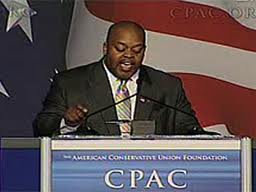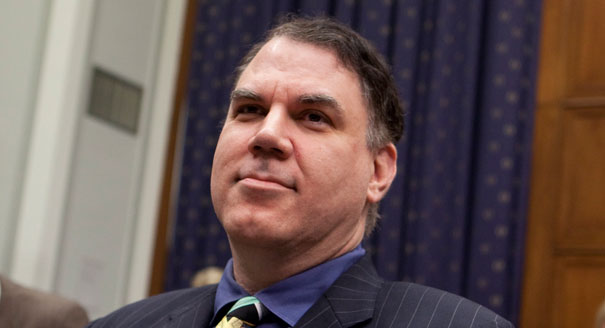[soundcloud url=”https://api.soundcloud.com/tracks/116700203″ width=”100%” height=”166″ iframe=”true” /]
Videos by Rare
Kurt Wallace recently sat down with civil rights leader Niger Innis to talk about Democrat Representative Alan Grayson’s racist comments about the tea party, where he compared them to the Ku Klux Klan.
Representative Alan Grayson: This shutdown ended up costing America $24 billion, that’s almost $100 for every man, woman and child in this country. Frankly, they want their money back, and they want the Tea Party out of their lives. At this point, the Tea Party is no more popular than the Klan.
Kurt Wallace for Rare: Alan Grayson sent out a fundraising letter with an image of a burning cross with the words “Tea Party” engulfed in flames, comparing them to the KKK. He also tweeted out “The Tea Party: ‘No more popular than the Klan.’” He continues to stand by his assessment, saying “The Tea Party candidates, including my opponent in the last election, have endorsed forcing Hispanics to speak English.” He added, “One could go on and on, because there is an overwhelming evidence that the Tea Party is the home of bigotry and discrimination in America today, just as the KKK was for an earlier generation. If the shoe fits, wear it.” What is the Tea Party? Is the Tea Party actually made up of people who are bigots, and why are they getting attacked as being like the KKK? Here to discuss, Niger Innis, currently serving as the National Spokesman for the Congress of Racial Equality Core and is the chief strategist for the TeaParty.net, and Niger, thank you for joining us today.
Niger Innis: It is my pleasure to be on with you, and you know, what an irony that not only a black man, but a civil rights leader also has the hat of being of one of, I say with humility, one of the leaders of the Tea Party movement, leading an organization — the TeaParty.net — that has three million members across this country. So, for Alan Grayson, to do what I think far too many Democratic politicians do, which is prostitute the legacy and the history of black Americans for their own political game, is disgusting and deplorable.
Kurt Wallace for Rare: Well, Alan Grayson has brought forward some serious allegations, which obviously need to be addressed, and I thank you for taking the time to talk to us about it. How do you deal with these kind of statements, being a part of such a large Tea Party organization, made up of a very diverse set of Americans?
Niger Innis: Well, you have to fight it. You have to push back, and you know that’s why I urge your listeners to go to my website, which is NigerInnis.com, sign the petition — end race-baiting racism, which is exactly what Alan Grayson is doing. It is exactly what, it is a poison — it is a disease that inflicts the Democratic Party right now — maybe not every Democrat, but large segments of the Democratic Party on a regular basis, be it Grayson, who is white and a Democrat, or Charlie Rangel, who is black and a Democrat. They are all part of this disease behavior, which is I call actually the Al Sharptonite nation of the Democratic Party. You know, Al Sharpton — between a superstar — by lying. You know, and using a lie that is a lot of (inaudible), that has either some of the most vicious racial connotones and connotes some bitter memories of black Americans and our women, who you know, a century or two ago who were sexually vulnerable, and he used that rape charge — that phony, fraudulent rape charge — race baiting, and he did so and became a superstar. Now ironically, even though Democrats today are employing those very same tactics, Al Sharpton has grown past that. Al Sharpton doesn’t play that game anymore, but unfortunately, a variety of Democratic legislators — including the President of the United States — has engaged, to some degree or another, in this race-baiting phenomenon.
Kurt Wallace for Rare: Now, Dustin Stockton wrote an article on Rare titled “The Tea Party vs. Politics,” he says that the Tea Party is a decentralized movement, void of official party infrastructure and leadership, yet the first few years the messaging was remarkably consistent at rallies and print and in the media, the message was simple: limited government, personal responsibility and fiscal sanity. No matter what kind of argument the mainstream media tried to drag us into, he says, we refused to delve into more controversial topics. Now, that is a description of a Tea Party that seems a lot different from what Alan Grayson is trying to describe it as.
Niger Innis: Exactly. And look, I understand what’s going on. You know, the Democrats jeer — they are terrified of the Tea Party. And why? Because after — you know, and I think history is going to look much more kindly on the Bush years than it currently does — but nevertheless, after eight years of George W. Bush, the Republican Party was tired. It was old. And quite frankly, it was very quite close to being a carcass. And it was the Tea Party Revolution that took place that almost singlehandedly revived the Republican Party, and I would argue, that bringing in fiscal sanity into Washington D.C. If this nation is saved, the historians will look back at November 2010 as the beginning of when this nation started to be saved, and that was because of the Tea Party Revolution that took place and the number of legislators that we brought into the Congress and the Senate: people like Marco Rubio, people like Rand Paul, people like Ted Cruz. And in the House of Representatives, we took over the House of Representatives; the Republican Party took over the House of Representatives with the Tea Party faction. So, I understand how Democrats are afraid of the Tea Party. They know that it’s the closest that we have as Republicans to community organizers in the country. They know that. Having said that, they, as they have sensed, that they would want to seek and destroy the Tea Party. What does not make sense, and what deeply troubles me deeply, is how establishment Republicans are often either innocent, dumb dukes or full partners in that destruction of their own grassroots army, the Tea Party movement.
Kurt Wallace for Rare: Now let’s go into some solutions, and I have to apologize to my audience that we have to even discuss such as side-show circus as this issue with Representative Grayson. But from a national view, what is the primary concern of the Tea Party at this time? And maybe we should be calling it the Tea Parties, because of its nature of being decentralized. But what is the primary concern right now?
Niger Innis: No, that’s well-put. That’s very well-put. And I would say among the variety of Tea Party organizations nationally, and among the many local Tea Parties across the country, you know, some of us are going to have some differences on foreign policy. Some of us are a little bit more libertarian; some of us are a little bit more hawkish. You know, some of us are going to have different points of view on social policy, be it immigration or be it life questions, you know, or be it marriage issues. You know, there’s going to be different points of view within the Tea Party movement and among the various Tea Parties. Having said that, if there’s one driving force that unites all of us, it is that we believe in our Constitution; we believe that what the Constitution says is what it’s meant by the Constitution. We don’t believe it’s some living, breathing organism that can just change over time. We believe that what is said in the Constitution is that what is meant in the Constitution. That’s number one. And number two, we believe in limited government and fiscal sanity and personal responsibility and in economic freedom. That is something that unites, and by the way, not just those who self-identify as Tea Party members, but Americans across the political spectrum, believe in those principles, even some Democrats, even some liberal Democrats, believe we should have fiscal sanity in Washington D.C. And 17 trillion dollars in debt — nearly 50 million Americans on food stamps, which constitutes over half the states in this country have a smaller population — combined — than 50 million people who are currently on food stamps. The lowest employment rate among women in 24 years; even liberals recognize that that is a recipe to economic disaster.
Kurt Wallace for Rare: Niger Innis, the TeaParty.net, the National Spokesman for the Congress of Racial Equality. Thank you very much for spending some time with us today on Rare.
Niger Innis: Thank you.
Niger Innis currently serves as the National Spokesman for the Congress of Racial Equality (CORE) and is the Chief Strategist for TheTeaParty.net. He works closely with the National Chairman and represents CORE across the United States and around the world. Mr. Innis is also the Co-Chairman of the Affordable Power Alliance (APA), a coalition of Latino and African American ministerial organizations, Senior Citizen Advocates and various Chambers of Commerce. The principal mission of APA is to fight against public policies that raise energy (and associated) costs. In addition to his role with CORE and APA, Innis is on the Advisory Committee of the National Center for Public Policy Research’s Project 21.




